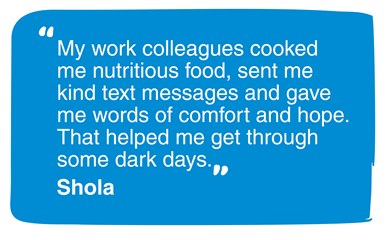In this blog, Content Developer Azmina gives practical tips for talking to your employer and other people at work about cancer.
When you have cancer, you may find the idea of talking about it upsetting or uncomfortable. But it is important to think about who needs to know and the best way to talk to them.
Telling your employer and other people at work about a cancer diagnosis may mean you get practical and emotional support. It can also help you make decisions that are right for you.
Talking to your employer
You may worry about telling your employer that you have cancer. Perhaps you are concerned that your employer may not support you. But you have important rights at work which mean that you should be properly supported and treated fairly through your cancer diagnosis and treatment.
If you have cancer, the law considers this a disability. You must not be treated less favourably than other people because you have cancer, or for reasons connected to the cancer. That would be discrimination.
Many people find their employer supportive. Here are 10 tips that may help you talk to them:
Talking to other people at work

You may be wondering whether to tell the people you work with about the diagnosis. Do not feel under pressure if you would find this too awkward or prefer to keep your work life as normal as possible. You know what works best for you. But sometimes treatment side effects, such as hair loss, may make it difficult not to tell people.
Talking to people at work about cancer can have benefits. For example:
Perhaps someone you trust at work could help you tell others. You could give people a short explanation of your treatment and side effects. For example, it may be useful to explain if tiredness is a problem, your concentration is affected, or you are at risk of infection.
If anybody avoids you in the workplace, this is probably because they do not know what to say or are worried about saying the wrong thing. Showing you are willing to talk about your illness may help.
More information
For more information, you can order our free booklets Talking about cancer and Work and cancer at be.macmillan.org.uk
To see what else Macmillan's cancer information team has been blogging about, please visit our blog home page! You can subscribe to receive our blogs by email or RSS too.
We're with you every step of the way
The Macmillan team is here to help. Our cancer support specialists can answer your questions, offer support, or simply listen if you need a chat. Call us free on 0808 808 00 00.
Comments? Feel free to add them below (you need to be logged in).
Whatever cancer throws your way, we’re right there with you.
We’re here to provide physical, financial and emotional support.
© Macmillan Cancer Support 2025 © Macmillan Cancer Support, registered charity in England and Wales (261017), Scotland (SC039907) and the Isle of Man (604). Also operating in Northern Ireland. A company limited by guarantee, registered in England and Wales company number 2400969. Isle of Man company number 4694F. Registered office: 3rd Floor, Bronze Building, The Forge, 105 Sumner Street, London, SE1 9HZ. VAT no: 668265007